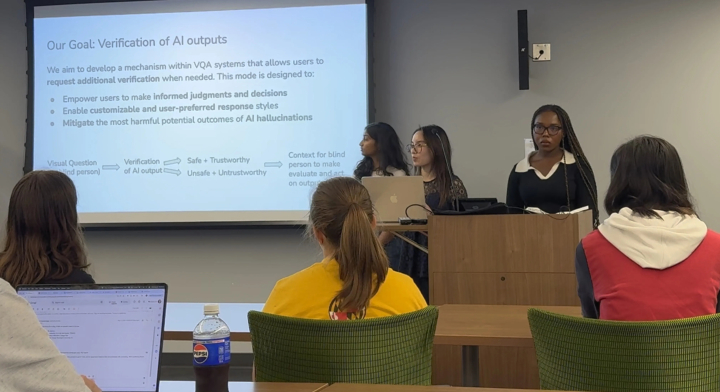TRAILS Summer Fellows Develop Technology to Enhance Reliability in AI Responses for Blind Users
Blind and low-vision (BLV) individuals face daily challenges accessing visual information. AI tools can assist with tasks like reading medication labels, identifying objects in photos, or interpreting images—but they are sometimes unreliable, with some AI tools providing answers that sound realistic but are not always correct.
To address this, undergraduate summer research fellows in the Institute for Trustworthy AI in Law and Society (TRAILS) built a system that adds a verification layer beneath the surface to provide BLV users with more reliable AI-generated answers in real time.
The work was part of the 2025 Summer Undergraduate Research Fellowships (SURF) program in TRAILS, which engages students in interdisciplinary research on trustworthy AI.
The five students working on the project—Tyler Austin, Adaeze Azubike, Chaitra Bhumula, Robert Hopkins and Tina Zeng—spent 10 weeks gathering data, brainstorming ideas and developing a prototype mobile app for BLV users.
From the outset, the researchers say, the design of the technology was shaped through direct participation of the BLV community, ensuring that accessibility and trust were embedded in the system rather than added on later.
The app the team developed, called VerifAI, allows users to upload images and ask follow-up questions in conversations with an AI-infused Visual Question Answering (VQA) system.
Behind the scenes, verification layers help the AI provide more reliable responses, and the system can prompt users for follow-up actions, such as taking a clearer photo, when an answer might otherwise be inaccurate.
“The TRAILS summer fellows balanced technical and accessibility perspectives in a way that stood out,” says Farnaz Zamiri Zeraati, a fifth-year computer science doctoral student at UMD who oversaw the team. “They moved beyond a purely technical project to one that considered user trust and real-world usability.”
Click HERE to read the full article
The Department welcomes comments, suggestions and corrections. Send email to editor [-at-] cs [dot] umd [dot] edu.
